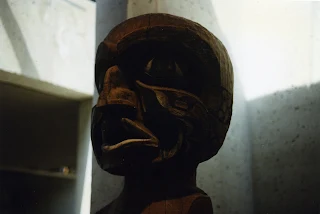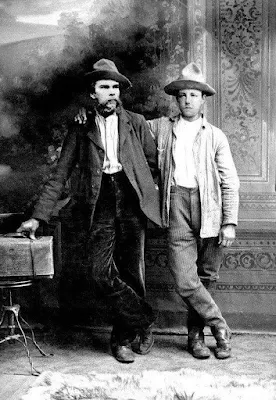Wednesday, December 3, 2008
Cutting-up Atlantis (Four)
Monday, December 1, 2008
Cutting-up Atlantis (Three)
Sunday, November 30, 2008
Upstairs at the Atwater Library







Saturday, November 29, 2008
Cutting-up Atlantis (Two)
Friday, November 28, 2008
Reading at Haven Art Gallery, NYC, September '08

Last September '08, CZ and I read at the Haven Art Gallery on Bruckner Boulevard in the South Bronx, NYC. It was 100 F in the shade... Above: Haven Art Gallery, .


CZ at the podium...

Here is Carol Novack who organized the reading. Carol is the publisher and editor of the widely read Mad Hatter's Review.
Thursday, November 27, 2008
Cutting-up Atlantis (One)
Wednesday, November 26, 2008
Stephen and Walt
Sunday, November 23, 2008
Cutting-up Atlantis
Sections Three to Five:
Friday, November 21, 2008
"Drummer Boy Raga" and Cut-ups
 |
| Vehicule Poets at Rare Books and Special Collections, McGill University giving a group reading on 26 April 2018 |
Like a collagist, selecting and snipping, Stephen immersed himself in the text, emerged with bits and phrases words, even syllables. Sometimes, his selection was to introduce fragments of what was to come, sometimes a reflection (refraction) of what had just passed. His breaking up the text in this fashion turned the piece in on itself, its meditative aspect. The work was now reaching inward as well as outward. He did not add one original phrase, not one external element, yet his contribution was instructive. In visual terms, he zoomed in on the fabric, the material, offering the work as “object”, built with breaths, words, thoughts.
Wednesday, November 19, 2008
Monday, November 17, 2008
Sunday, November 16, 2008
The Vehicule Poets' last meeting, 2004
 From left: Artie Gold, Claudia Lapp's husband Gary, Ken Norris, Ruth Taylor sitting beside Ken, Claudia Lapp (standing), Tom Konyves, and the back of Endre Farkas's head... This was the morning after the Vehicule Poet's performance at Place des Arts in April 2004, at La Brise Restaurant (now Starbucks) across the street from Artie's apartment. Copies of the anthology, The Vehicule Poets_Now (edited by Tom Konyves and Stephen Morrissey; published by The Muses' Company, Winnipeg, 2004) were distributed. I am not too sure why John McAuley wasn't present.
From left: Artie Gold, Claudia Lapp's husband Gary, Ken Norris, Ruth Taylor sitting beside Ken, Claudia Lapp (standing), Tom Konyves, and the back of Endre Farkas's head... This was the morning after the Vehicule Poet's performance at Place des Arts in April 2004, at La Brise Restaurant (now Starbucks) across the street from Artie's apartment. Copies of the anthology, The Vehicule Poets_Now (edited by Tom Konyves and Stephen Morrissey; published by The Muses' Company, Winnipeg, 2004) were distributed. I am not too sure why John McAuley wasn't present. Artie, going home...
Artie, going home...
A few days earlier, at St. Viateur Restaurant on Monkland, from left, Tom Konyves, Endre Farkas, Claudia Lapp, Stephen Morrissey.
Saturday, November 15, 2008
Shamanism and Poetry
Reflecting upon these events, I understood for the first time that a certain kind of work, resembling what Jung calls "visionary art," functions in much the same way as the shaman in tribal societies. That is, some art is shamanic in function. Formed from the collective unconscious material, it activates the unconscious of its audience and mobilizes the psyche's self-healing capacities. It opens a door to a different reality, the world of dreams and imagination, and "spirits" silently pass into the world of every day, affecting people in unexamined ways.
Shamanic art undermines unexamined cultural assumptions. For this reason it disturbs some people and may even arouse rage. Those who are open to it, however, often find that it sets their own creativity in motion.
Such art tends to be prophetic. It asks, even insists, on being heard, just as shamans are compelled to tell about their inner experiences when they begin to apply what they have learned about healing themselves to their healing of others. The visionary creative act is not complete until it finds an audience, coming out into the world and disturbing the complacent surface of collective consciousness. If the process is blocked, one outcome may be psychosis. Cancer may be another.
Shamanic art brings eros values to the healing of the psyche. That is, unlike traditional clinical psychology and psychiatry, it is more concerned with connecting and making whole than with the logos values of dissecting and understanding. It is related to a form of psychotherapy that interprets rarely, seeking instead to set in motion a symbolic process that has its own unforseeable healing goal. Understanding of behaviour is important only to the extent that it serves a living relationship to deep levels of the psyche. . . The soul of the shaman lies equally behind the visionary artist and the therapist who works in this way. If the shamanic type of therapist ceases to live her own creative life, the capacity to function in healing ways becomes lost and may even turn destructive. (36 - 37)
Friday, November 14, 2008
Shamanism and Poetry, some definitions (One)
Tuesday, November 11, 2008
Cut-ups, series 1.6
A SEAS
Forward! The marchweariness and anger.
To whom shall I
should I adore? What
hearts shall I break?
what blood tread?
the intractable convict
are always closing; I sought
houses he would have
with his idea I saw the blue
of the country; in the cities
more strength than a saint,
a traveler—and he,
glory and his reason.
nights, without roof, with
a voice gripped my frozen
Still but a child,
on whom the prison doors
the inns and rooming
secrated by his passing;
sky, and the flowery labor
sensed his fatality. He had
more common sense than
alone! the witness of his
On highroads on winter
without clothes, without bread,
_________________________
Cut-up of Arthur Rimbaud
Monday, November 10, 2008
Cut-ups, series 1.5
Let me sleep! Eat the pebbles that one breaks,
At the altars of Churches’ old stones;
Broth run over Gravel of ancient deluge taste,
And mix with and loaves scattered in grey brakes
ON IN HELL
At last, O happiness,
the burden and the desert,
sky the azure that is dark
of pure light. Out of
myself? What beast
clownish and blank as Poly
image is attacked? What
lies should I uphold?
_________________________Cut of Arthur Rimbaud
Sunday, November 9, 2008
Cut-ups, series 1.4
Howling beneath the leaves
with withered fist
The wolf spits out the lovely plumes
And thus no old age, no
Of his feast of fowls:
Like him I am consumed.
forsaken that to any divine
my impulses toward
Let me seethe
Solomon.
Rather steer clear of the rust
brutishness,—to lift the Cedron.
fin’s lid, to sit, to suffocate
dangers: terror is not
O reason, I brushed from the
—Ah! I am so utterly, and I lived—gold spark
image whatsoever, I took on an expression as
possible:
Salads and fruits
O my abnegation,
O Await but the picking;
below, however!
But violets are the food
De profundis, Domine, Of spiders in the thicket.
_________________________
Cut-up of Arthur Rimbaud
Saturday, November 8, 2008
Cut-ups, series 1.3
and liberty?
Alas! The Gospel!
Greedily I await God.
Cut-up of Arthur Rimbaud
Friday, November 7, 2008
Cut-ups, series 1.2
Your white
The cradle
The sparse
This year or next yearArt criticism is as imbecile as Esperanto
Brindisi Goodbye goodbye
I was born in this city
And my son too
I’ve never liked Mascagni
Nor art nor artists
I’ve envied a woman
to be a woman
Bon voyage!
Let me carry you off
You who laugh at red
to the childbearing future
I envy your ease
Ocean liners of factories
At anchor
April 1914
_________________________
Cut-up of Blaise Cendrars
Thursday, November 6, 2008
Cut-ups, series 1.1
 |
| Cutlery placement |
BOMBAY EXPRESS
Ah! what’s more: They rush out of their cells
red clearing with old courtyard
I can remember They kidnap the young prisoner
land and Christianity. I get into a carriage which
myself in the past. But They leave at top speed
; and even the langue While the guards empty their
I cannot see myself
Some of the guards jump on horses
convicts
__________________________________
Cut-up of Arthur Rimbaud and Blaise Cendrars
.JPG)















